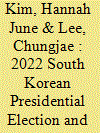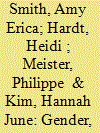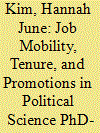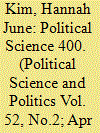|
|
|
Sort Order |
|
|
|
Items / Page
|
|
|
|
|
|
|
| Srl | Item |
| 1 |
ID:
185526


|
|
|
|
|
| Summary/Abstract |
The 2022 South Korean presidential election was the country’s most closely contested election since a democratic direct electoral system was initiated in 1987, with less than a 1 percent difference separating the two major candidates among 34 million votes cast. Despite some parallels with and continuities from previous elections, the 2022 election saw new voting alignments emerge based on one topic: gender equality. In this essay, we explain how and why gender became such a prominent issue during the 2022 election campaign, and how this affected voting patterns, especially among male and female voters in their twenties and thirties. Specifically, we argue that gendered voter behaviour during the election arose from rising anti-feminist sentiments among young men, and that the two main presidential candidates politicized the issue to maximize support from this group. This in turn triggered the consolidation of a young female voting bloc. Using an original survey conducted in January 2022 with an approximate nationally representative sample of 1,017 respondents, we identify two possible causes of rising anti-feminist sentiments among young men: the belief that women receive preferential treatment in employment opportunities and mandatory military service for men. In addition, through an embedded survey experiment run before the election, we proposed that political candidates with pro-gender messages would be less likely to receive support from young men, while candidates with anti-gender messages would be likely to receive more support; these projections were confirmed by the actual voting breakdowns of the recent election. The results suggest that the new administration must handle gender issues with extreme care to ensure that divergent perceptions of the gender divide do not become further polarized over the next few years, since such a development could very well fuel democratic deconsolidation in South Korea.
|
|
|
|
|
|
|
|
|
|
|
|
|
|
|
|
| 2 |
ID:
171286


|
|
|
|
|
| Summary/Abstract |
Numerous studies document female scholars’ underrepresentation in political science publications and citations, yet few examine graduate syllabi. In this study, we assess the impact of instructors’ individual characteristics (i.e., race, gender, and age) on which readings they assign. We use what is—to our knowledge—the largest dataset of graduate readings to date: the GRaduate Assignments DataSet (GRADS), with 75,601 readings from 840 syllabi in 94 US PhD programs. We report several findings. First, overall, instructors infrequently assign female-authored scholarship relative to the rates at which women publish. Second, instructors who are women, people of color, and those from more gender-equal countries assign significantly more female-authored readings than white male instructors and those from less gender-equal countries. Third, among women—but not men—older instructors assign more female-authored work. We suggest that women’s underrepresentation on syllabi may contribute to “the leaky pipeline,” which describes women’s attrition from academic careers.
|
|
|
|
|
|
|
|
|
|
|
|
|
|
|
|
| 3 |
ID:
168718


|
|
|
|
|
| Summary/Abstract |
Using updated data from 2002 and 2017 on the political science discipline, we show how the cohort and gender composition of US PhD-granting departments has changed dramatically over time. Integrating 2002 and 2017 data, we examine overall patterns and gender differences in job mobility, tenure and promotion, and university prestige level among non-emeritus 2002 faculty, controlling for cohort effects. Even with this control, we find strong gender effects in some of these success dimensions. We then introduce another variable, citation counts, and find that women are consistently less cited than men, with important variations in the pattern across different cohorts. A control for citation counts show that some of these gender differences tend to disappear and we consider possible explanations for these findings.
|
|
|
|
|
|
|
|
|
|
|
|
|
|
|
|
| 4 |
ID:
165507


|
|
|
|
|
| Summary/Abstract |
This article updates the Masuoka, Grofman, and Feld 2002 dataset that identified the then-3,719 faculty in political science PhD-granting departments in the United States. That dataset contained information about each faculty member, including date and PhD-granting department, lifetime citation counts, fields of interest, and school of employment. We similarly create a database with the 4,089 currently tenured or tenure-track faculty, along with emeritus faculty, at US PhD-granting departments ca. 2017–2018. Using Google Scholar Profiles, along with manual counts for those who do not have a profile, we sort the dataset by citation count, PhD cohort, field of interest, and gender. This article identifies the 100 currently most-cited scholars, the 25 most-cited in each PhD cohort and subfield, the 40 most-cited women scholars, and the 25 most-cited emeriti. The full list of The Political Science 400 is available in an online appendix.
|
|
|
|
|
|
|
|
|
|
|
|
|
|
|
|
| 5 |
ID:
173314


|
|
|
|
|
| Summary/Abstract |
This article uses data collected from Google Scholar to identify characteristics of scholars who have chosen to create a Google Scholar profile. Among tenured and tenure-track faculty with full-time appointments in PhD-granting political science departments, we find that only 43.7% have created a profile. However, among R1 faculty, young and early-career faculty are more likely to have Google Scholar profiles than those in older cohorts. Although subfield differences are largely nonexistent, there is a notably low proportion of theory faculty with profiles and a slightly higher proportion with profiles among methodologists. Moreover, within cohorts, those who are highly cited are more likely to have profiles than those who have low citation counts. We conclude by discussing implications of our findings, the increasing usage of Google Scholar and profiles, and the increasing importance of an online presence in the academy.
|
|
|
|
|
|
|
|
|
|
|
|
|
|
|
|
|
|
|
|
|